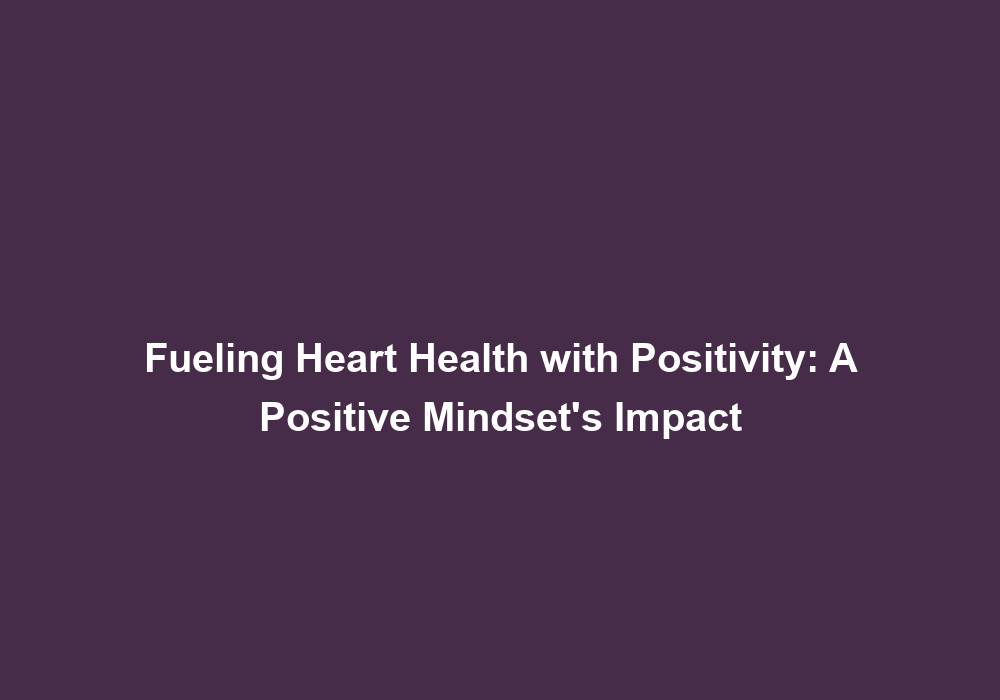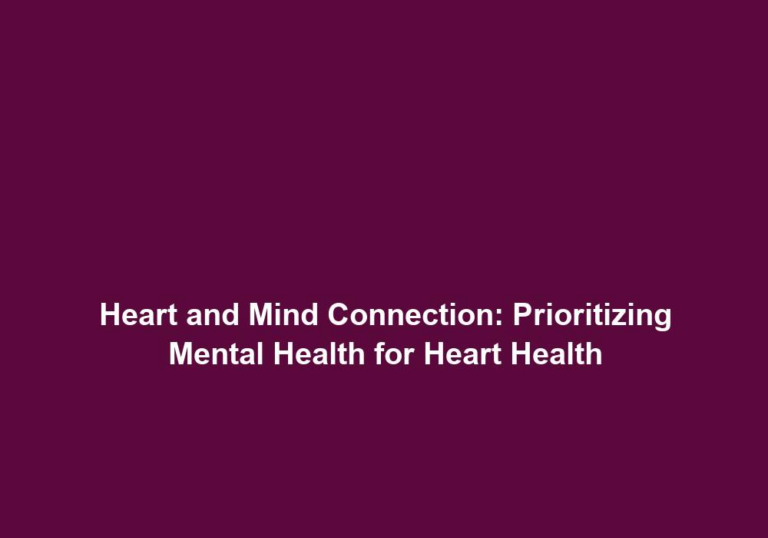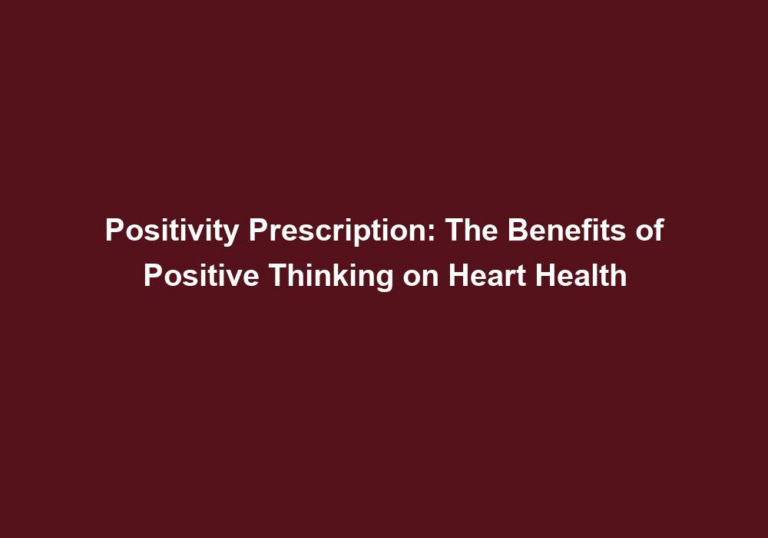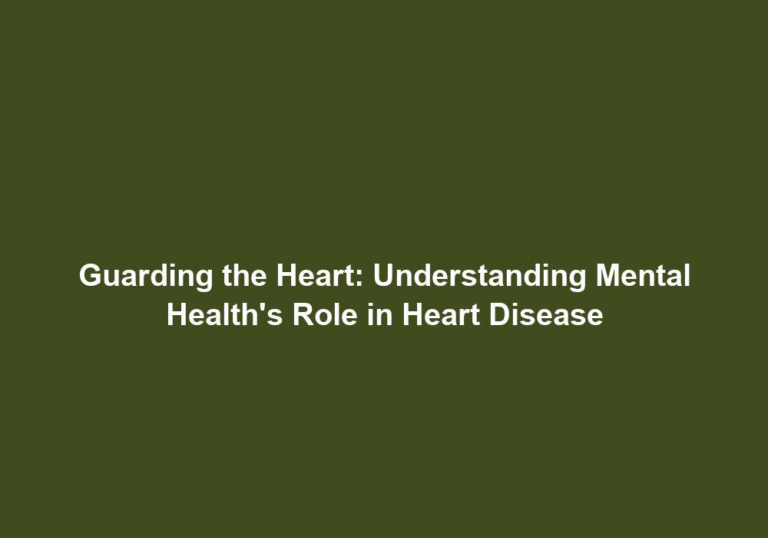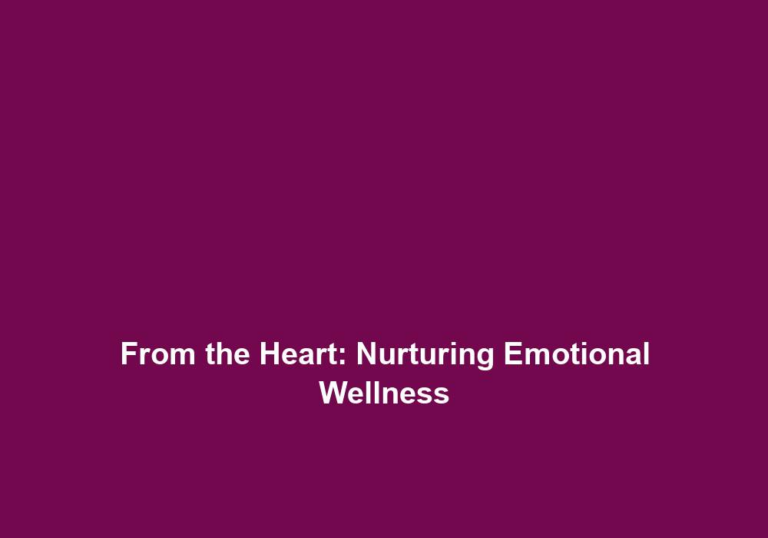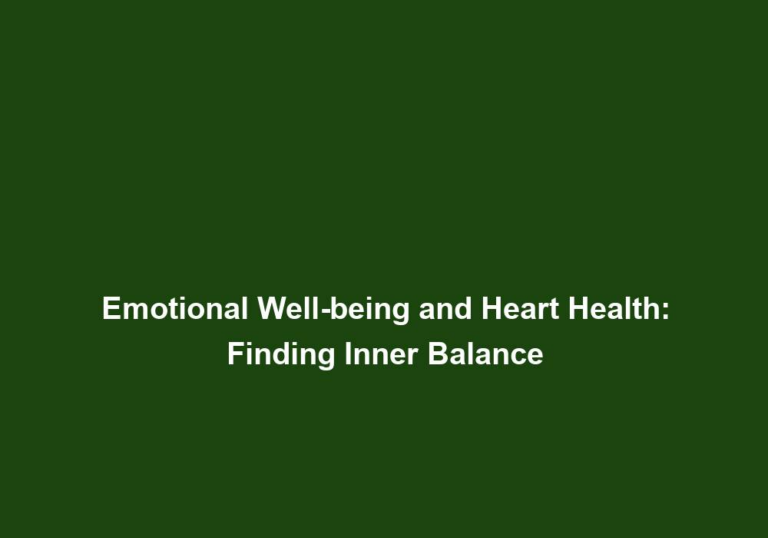Fueling Heart Health with Positivity: A Positive Mindset’s Impact
In today’s fast-paced world, it’s easy to get caught up in the stresses and demands of everyday life. Our minds are constantly bombarded with negativity from various sources, be it work pressures, news headlines, or personal challenges. However, research shows that cultivating a positive mindset can have a profound impact on our overall health, particularly when it comes to our hearts. In this article, we will explore the ways in which positivity can fuel heart health and the strategies you can adopt to cultivate a positive mindset.
The Connection Between Positivity and Heart Health
-
Reduced Stress Levels: High-stress levels can lead to a range of adverse health effects, including an increased risk of heart disease. When we maintain a positive mindset, we are better equipped to cope with stress and reduce its impact on our bodies. Positive emotions can counteract the harmful effects of stress hormones and promote cardiovascular health.
-
A positive mindset helps to reduce stress levels, which in turn lowers the risk of heart disease. When we approach stressful situations with a positive outlook, we are able to manage the stress more effectively, preventing it from negatively impacting our hearts.
-
Positive emotions, such as joy, happiness, and contentment, have been found to counteract the effects of stress hormones like cortisol, which is known to contribute to heart disease. By cultivating a positive mindset, we can regulate our stress response and protect our hearts from the damaging effects of chronic stress.
-
Research has shown that positive emotions can promote cardiovascular health by improving heart rate variability, reducing inflammation, and enhancing the function of the endothelium, which is the lining of our blood vessels. By reducing stress levels, positivity plays a crucial role in maintaining a healthy heart.
-
-
Improved Emotional Well-being: Cultivating a positive mindset promotes emotional well-being and helps manage negative emotions such as anxiety, anger, and depression. When we experience positive emotions, our bodies release endorphins, which are known as feel-good hormones. These endorphins not only enhance our mood but also have a positive impact on our heart health.
-
A positive mindset fosters emotional well-being by helping us manage negative emotions more effectively. When we approach challenges and setbacks with a positive outlook, we are better able to regulate our emotions and prevent them from overwhelming us.
-
Positive emotions, such as happiness and gratitude, have been shown to have a direct impact on our heart health. When we experience these positive emotions, our bodies release endorphins, which not only make us feel good but also have a protective effect on our hearts. Endorphins can help reduce inflammation, improve blood flow, and enhance the function of our blood vessels.
-
Cultivating a positive mindset can also help prevent the development of mental health conditions such as anxiety and depression, which have been linked to an increased risk of heart disease. By managing our emotional well-being, positivity plays a crucial role in maintaining a healthy heart.
-
-
Enhanced Resilience: Building a positive mindset improves our resilience, allowing us to bounce back from setbacks and challenges more effectively. Resilience plays a crucial role in maintaining good heart health, as it helps us navigate through difficult situations with a sense of optimism and determination.
-
A positive mindset enhances our resilience by fostering a sense of optimism and hope. When we approach challenges with a positive outlook, we are more likely to believe in our ability to overcome them, which in turn enhances our resilience.
-
Resilience is important for maintaining good heart health because it helps us cope with stress and adversity in a healthy way. By developing a positive mindset, we can build resilience and effectively navigate through difficult situations without compromising our heart health.
-
Research has shown that resilient individuals are more likely to engage in healthy behaviors, such as regular exercise and maintaining a balanced diet, which are essential for heart health. By cultivating a positive mindset and enhancing our resilience, we can adopt healthier habits that contribute to a healthy heart.
-
-
Better Coping Mechanisms: A positive mindset equips us with effective coping mechanisms that can positively influence our heart health. Instead of resorting to unhealthy habits like emotional eating or excessive drinking, individuals with a positive mindset are more likely to engage in healthier coping strategies, such as exercising, practicing mindfulness, or seeking social support.
-
A positive mindset promotes healthier coping mechanisms by encouraging individuals to seek out positive and constructive ways to deal with stress and adversity. Instead of turning to unhealthy habits, such as emotional eating or excessive drinking, individuals with a positive mindset are more likely to engage in activities that promote heart health, such as exercise, mindfulness, or seeking social support.
-
Engaging in regular exercise has been shown to have numerous benefits for heart health, including reducing the risk of heart disease and improving cardiovascular function. Individuals with a positive mindset are more likely to prioritize exercise as a coping mechanism, leading to better heart health outcomes.
-
Practicing mindfulness and seeking social support are also effective coping strategies that can positively impact heart health. Mindfulness helps reduce stress levels and promote emotional well-being, while social support provides a sense of belonging and reduces feelings of loneliness and isolation, which are known risk factors for heart disease.
-
Strategies for Cultivating a Positive Mindset
-
Practice Gratitude: Cultivating an attitude of gratitude can significantly impact our overall well-being. Take a few moments each day to reflect on the things you are grateful for. This simple practice can shift your focus from negativity to positivity and promote a healthier mindset.
-
Make it a habit to write down three things you are grateful for each day. This practice helps train your brain to focus on the positive aspects of your life and encourages a more positive mindset.
-
Express your gratitude to others. Take the time to thank someone for their kindness or help. By acknowledging and appreciating the positive things in your life, you can cultivate a sense of gratitude and foster a positive mindset.
-
Look for the silver linings in challenging situations. Even in difficult times, there are often positive aspects or lessons to be learned. By reframing negative experiences and finding the positive, you can shift your mindset towards positivity.
-
-
Surround Yourself with Positivity: Surround yourself with people who radiate positivity and support your well-being. Engage in activities that bring you joy and fulfillment. Whether it’s spending time with loved ones, pursuing hobbies, or engaging in volunteer work, surrounding yourself with positivity can have a profound impact on your mindset and heart health.
-
Seek out positive and supportive relationships. Surround yourself with people who uplift and inspire you. Spend time with loved ones who bring joy to your life and encourage a positive mindset.
-
Engage in activities that bring you joy and fulfillment. Whether it’s pursuing a hobby, participating in a creative outlet, or engaging in volunteer work, doing things that make you happy can have a positive impact on your mindset and contribute to a healthier heart.
-
Limit exposure to negativity. Be mindful of the media you consume and the conversations you engage in. Surround yourself with positive influences and create an environment that fosters positivity and supports your heart health.
-
-
Challenge Negative Thoughts: Negative thoughts can easily cloud our minds and hinder our ability to maintain a positive mindset. Challenge negative thoughts by questioning their validity and replacing them with positive and empowering affirmations. This practice can help rewire your brain to focus on the positive aspects of life.
-
Become aware of your negative thoughts. Pay attention to the thoughts that arise in your mind and question their accuracy. Ask yourself if there is evidence to support these thoughts or if they are simply based on fear or self-doubt.
-
Replace negative thoughts with positive affirmations. Whenever you catch yourself thinking negatively, consciously replace those thoughts with positive affirmations. Repeat these affirmations to yourself regularly to rewire your brain and cultivate a more positive mindset.
-
Practice self-compassion. Be kind to yourself and treat yourself with the same love and understanding you would offer to a friend. By practicing self-compassion, you can counteract negative self-talk and cultivate a more positive and nurturing mindset.
-
-
Engage in Self-Care: Prioritizing self-care is essential for cultivating a positive mindset. Take care of your physical and mental well-being by engaging in activities that nourish your body and soul. This can include getting regular exercise, practicing mindfulness or meditation, getting enough sleep, and maintaining a balanced diet.
-
Make time for regular exercise. Engaging in physical activity not only improves your physical health but also has a positive impact on your mental well-being. Find activities that you enjoy and make exercise a priority in your daily routine.
-
Practice mindfulness or meditation. Set aside a few minutes each day to quiet your mind and focus on the present moment. Mindfulness and meditation can help reduce stress levels, improve emotional well-being, and promote a positive mindset.
-
Get enough sleep. Prioritize quality sleep by establishing a bedtime routine and creating a sleep-friendly environment. Sufficient sleep is essential for recharging your body and mind, and it plays a crucial role in maintaining a positive mindset.
-
Maintain a balanced diet. Fuel your body with nutritious foods that support heart health and overall well-being. A balanced diet rich in fruits, vegetables, whole grains, and lean proteins can provide the nutrients your body needs to function optimally and support a positive mindset.
-
-
Celebrate Small Wins: Recognize and celebrate your achievements, no matter how small they may seem. Acknowledging your progress and accomplishments boosts your self-confidence and fosters a positive mindset. Each small win brings you one step closer to your goals and contributes to your overall well-being.
-
Keep a journal of your achievements. Write down your accomplishments, no matter how big or small, and reflect on them regularly. By acknowledging your progress, you can cultivate a sense of pride and motivation to continue pursuing your goals.
-
Share your wins with others. Celebrate your achievements with loved ones or a supportive community. By sharing your successes, you not only inspire others but also reinforce your positive mindset and create a supportive network.
-
Set realistic goals and break them down into smaller milestones. By focusing on small wins along the way, you can maintain motivation and momentum towards your larger goals. Celebrate each milestone as a step forward in your journey.
-
Conclusion
A positive mindset is more than just a fleeting emotion; it is a powerful tool that can positively influence our overall health, including our heart health. By reducing stress levels, improving emotional well-being, enhancing resilience, and promoting healthier coping mechanisms, positivity plays a vital role in fueling heart health. By incorporating strategies such as practicing gratitude, surrounding yourself with positivity, challenging negative thoughts, engaging in self-care, and celebrating small wins, you can cultivate a positive mindset and enjoy the numerous benefits it brings to your heart and overall well-being. Embrace the power of positivity and take proactive steps towards nurturing a healthier heart today.

